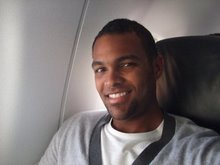
"Even the most incorrigible maverick has to be borne somewhere. He may leave the group that produced him--he may be forced to--but nothing will efface his origins, the marks of which he carries with him everywhere. I think it is important to know this and even find it a matter of rejoicing, as the strongest people do, regardless of their station. On this acceptance, literally, the life of a writer depends."
On Saturday, I had the opportunity to hear the prolific and award-winning author Junot Díaz speak alongside the prolific and award-winning journalist Alma Guillermoprieto at the Hay Festival in Cartagena. Held each year in the dimmed jewel of the Spanish Main, a scant two hours from where I live in Barranquilla, the Hay Festival brings together some of the world's most impactful literary figures for a three-day celebration of the written word, and featuring luminaries such as Alice Walker and this year's headliner, Salman Rushdie. Well, I didn't trek it over to Cartagena to see Salman; I went to see Junot.
Having first caught my eye with his collection of short stories called Drown back while I was earning my MFA in creative writing, Junot completely hooked, fileted, and fried me with his Pulitzer Prize-winning debut novel, The Brief Wondrous Life of Oscar Wao. The book follows, in fluid Spanglish, the ups and downs and arounds of an overweight Dominican nerd in New Jersey who just wants to get laid. Interspersed are the life stories of his beautiful dark-skinned mother, of his rebellious sister (like mother, like daughter), and of the Dominican Republic itself. The book resonates with me on pretty much every level: I was a fat nerd, I gots stupid love for the DR (the first foray into Latin America), and I'm mesmerized by Junot's weaving of humorous and vernacular anecdotes about Dominican history and culture into the narrative that exalt the country's oft-ignored African and Taíno roots. I appreciate that the book offers space for Junot's (and his characters') latinidad and blackness to co-exist, since, to my way of thinking, they are not mutually exclusive. And during the five minutes I spoke with him in the autograph line, that same appreciation was validated repeatedly.
Junot and Alma sat semi-comfortably on sofas in the cloistered courtyard of a large cathedral, bathed in sunlight, and interviewed by their Spanish-language editor, in Spanish, about writing mostly in English (supposedly their "second" language, but she went to bilingual schools all her life and he grew up mostly in the States) and their take on Obama's presidency (friendly debate between the two about the [supposedly monolithic] "Latino community's" supposed resistance to a black man as president). Politically astute and left-leaning, the irony was not lost on either writer that the majority of the audience in attendance was the conservative and self-congratulating elite of Cartagena.
After the chat, I waited my turn in the autograph line and greeted Junot with an extended hand and an English "Mr. Díaz." Immediately he said, "Brother," and we embraced in a full bruh-man hug in acknowledgment of immediately assumed and understood historical, cultural, social and political commonalities. I'd never met the man before in my life, but for the next five minutes, we discussed MFA programs and the randomness of travel and the awesomeness of the inauguration and the craziness of Latin America and the very proud local resentment toward Obama and the beauty of Santo Domingo. Plans were made to grab drinks later and continue the stream of convo, but as typical of prize-winning novelists at literary festivals, he got waylayed during the evening (probably caught-up with Salman). Still, that five-minute connection reminded me that, despite dealing with willful ignorance in and out of the classroom, and hearing often that even highlighting the very African elements and contributions evident in Latin American societies (that attract me to those societies) is itself racist and alienating, there are people who know...understand...appreciate.
He signed my copy of The Brief Wondrous Life of Oscar Wao:
Ernest, My brother: Strength.
Thank you, Brother Junot.











1 comment:
Ohhh...I love literary posts and Junot Díaz is great. He has great short stories in the New Yorker!
This definitely sounds like a memorable event and the fact that Cartagena has a literary festival makes it even more appealing as one of the place I most want to visit.
Thanks!
Btw: how many lives have you lived?? Senate-intern, MFA in creative writing, traveler, blogger, teacher....any favorites?
Post a Comment